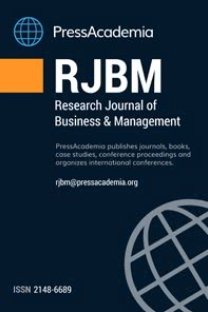INDUSTRY 4.0 AND COMPETITIVENESS
Purpose- Recent developments in information technology lead to a new industrial revolution, transforms the entire eco-system. The last industrial revolution of the information society is referred to as Industry 4.0. This paper tries to explain fourth industrial revolution with its basic concepts and draws attention to dramatic changes in the production systems and competition environment in the World and Turkey.Methodology- This paper used a qualitative method, present and discussed the opportunities and challenges in implementation of Industry 4.0 especially in terms of competitiveness.Findings- Industry 4.0 have a substantial potential to change global competition environment and can be seen as a great opportunity Turkey's development and improvement in competitiveness, although the state of preparations for its implementation are very limited for now.Conclusion- The present study contributes the Industry 4.0 literature by drawing attention to its relationship between competitiveness.
Keywords:
Industry 4.0, competitiveness, innovation technology, production systems,
___
- Aktan, C.C., Vural, İ.Y., (2004). Yeni Ekonomi ve Yeni Rekabet, Ankara, Türkiye İşveren Sendikaları Konfederasyonu (TİSK), Rekabet Dizisi: 1, Yayın No: 253
- Almada-Lobo, F.,(2015) “The Industy 4.0 Revolution and The Future Of MES.” Journal of Innovation Management JIM 3, 4, 2015: 16-21. DOI: 10.24840/2183-0606_003.004_0003
- Çivi, E., (2001). Rekabet Gücü: Literatür Araştırması, Yönetim ve Ekonomi, Cilt:8, Sayı:2, pp.21-38.
- Demir, İ., (2001). Türkiye Beyaz Eşya Sanayinin Rekabet Gücü ve Geleceği, Ankara, DPT, Yayın No: 2571
- EBSO. (2015) Sanayi 4.0 Uyum Sağlamayan Kaybedecek. Ege Bölgesi Sanayiciler Odası, Araştırma Müdürlüğü.
- Evans, D., (2011) The Internet of Things How the Next Evolution of the Internet Is Changing Everything. CISCO white paper
- Gubán & Kovács. (2017). Industry 4.0 Conception. Acta Technica Corvınıensıs- Bulletin of Engineering. X.19
- Kaggermann, Henning (2015), “Change Through Digitazation-Value creation in the Age of the Industry 4.0. Management of Permanent Change”, p. 23-45.
- Khan A., Turowski K.(2016) “A Perspective on Industy 4.0: From Challenges to Opportunities in Production Systems.” Proceedings of the International Conference on Internet of Things and Big data, Rome, p.441-448
- KPMG.(2015) “Sanayi 4.0, Dördüncü Sanayi Devrimi, Yarının Fabrikaları Neye Benziyor?”. Kasım,2015
- Lydon, B., (2016). Industry 4.0: Intelligent and flexible production: Digitization improves manufacturing responsiveness, quality, and efficiency, In Tech Magazine, May-June 2016, Cover story
- Martin, M. Building The Impact Economy; Our Future Yea or No. Springer International Publishing. Switzerland.
- Mersin Ticaret Ve Sanayi Odası(2017). “Türkiye, Avrasya'nın Endüstri 4.0 Merkezi Olabilir.” Retrieved from Http://www.mtso.org.tr/tr/haberler/turkiye-avrasya-nin-endustri-4-0-merkezi-olabilir
- Porter, M. E., Stern, S., (1999). The New Challenge to America’s Prosperity: Findings from the Innovatıon Index,Council on Competitiveness Publication Office, Washington D.C.
- PWC (2016), “Industry 4.0: Building the digital enterprises”. Retrieved from https://www.pwc.com/gx/en/industries/industries-4.0/landing-page/industry-4.0-building-your-digital-enterprise-april-2016.pdf
- Rüßmann, M., Lorenz, M., Gerbert, P., Waldner, M., Justus, J., Engel, P., Harnisch, M. (2015). Industry 4.0: The Future of Productivity and Growth in Manufacturing Industries, Boston Consulting Group.
- Roblek, V., Mesko, M. & Krapez, A. (2016). “A complex view of Industry 4.0”, SAGE Open, April-June 2016, pp. 1-11.
- Roland Berger (2014) “Industry 4.0 - The new industrial revolution – How Europe will succeed.” Roland Berger Strategy Consultants.
- Şahin, A. (2017) “Akıllı üretim çağı: Endüstri 4.0”, Fortune Dijital, Retrived from http://www.fortuneturkey.com/akilli-uretim-cagi-endustri-40-42841,
- Sarıçoban, K. (2013). Küresel Rekabette Kümelenme ve İnovasyonun Rolü, Sosyal ve Beşeri Bilimler Dergisi, ISSN: 1309-8012 (online), 94-104.
- Sommer, L. (2015). Industrial revolution-industry 4.0: Are German manufacturing SMEs the first victims of this revolution. Journal of Industrial Engineering and Management, 8(5), 1512–1532.
- Taş, R. (2005). Ar-Ge Yoğunluğu-Rekabet Gücü İlişkisi Açısından Türkiye-AB Karşılaştırmalı Analizi, Türkiye’de Yeniden Mali Yapılanma 20.Türkiye Maliye Sempozyumu, Pamukkale, 23-27 Mayıs 2005.
- TİSK, (1995). Türkiye’nin Rekabet Gücü: AB Ülkeleri, Japonya ve ABD Karşılaştırmalı, TİSK İnceleme Yayınları No: 15, Ankara.
- TÜBİTAK (2016), Yeni Sanayi Devrimi Akıllı Üretim Sistemleri Teknoloji Yol Haritası, Ankara: TÜBİTAK Bilim, Teknoloji ve Yenilik Politikaları Daire Başkanlığı.
- TÜSİAD ve BCG (2016) Türkiye’nin Küresel Rekabetçiliği için Bir Gereklilik Olarak Sanayi 4.0: Gelişmekte Olan Ekonomi Perspektifi, İstanbul: TÜSİAD.
- Salgar, U., Dereli D.D., (2018): “Economic Impacts of Industry 4.0 / Sanayi 4.0’ın Ekonomik Etkileri”, Current Debates in Economics, Ed.: Ayşe Cebeci, Erika Torres, H. Gülçin Beken, IJOPEC Publication, Vol.18, (153-163)
- Wikipedia, Retrieved from https://en.wikipedia.org/wiki/Robot
- World Economic Forum. (2018). The global competitiveness report 2017-2018. Geneva: World Economic Forum
- Yıldızlı Proje Danısmanlık. Retrieved from https://www.endustri40.com/artirilmis-gerceklik-augmented-reality/
- Zhou K., Liu T., and Zhou L. (2016). “Industry 4.0: Towards Future Industrial Opportunities and Challenges.” International Conference on Fuzzy Systems and Knowledge Discovery, Vol.2016 (12), pp. 2147–2152
- Yayın Aralığı: Yılda 4 Sayı
- Başlangıç: 2014
- Yayıncı: PressAcademia
